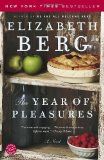Summary | Excerpt | Reading Guide | Reviews | Beyond the Book | Readalikes | Genres & Themes | Author Bio

Excerpt
The Year of Pleasures
I had been right to want to drive to the Midwest, taking only the back roads.
Every time my husband, John, and I had taken a trip more than a few miles away,
we'd flown, and had endured the increasingly irritating airport protocols. I'd
finally begun to wear what amounted to pajamas so that I wouldn't have to all
but strip before security guards who seemed either worrisomely bored or, equally
worrisome, inflated with a mirthful self-importance. It was hard to believe that
air travel had ever been considered glamorous, when now what most people felt
was a seesawing between anxiety and exasperation. "Well, folks, looks like our
time has been pushed back again," the captain would say, and everyone would
shake their heads and snap their newspapers and mutter to their neighbor. And if
there was unexpected turbulence, a quivering silence fell.
Now, on this road trip, my mind seemed to uncrinkle, to breathe, to present
to itself a cure for a disease it had not, until now, known it had. Rather than
the back of an airline seat or endless, identical rest stops on the interstate,
I saw farmhouses in the middle of protective stands of trees, silos reaching for
the sky, barns faded to the soft red of tomato soup. The weather everywhere
stayed stubbornly warm, and people seemed edgily grateful—what could this mean,
sixty-degree weather in November? I drove through one small town where old
people sat on rockers on front porches and kids tore around corners on bikes and
young mothers, jackets tied around their waists, proudly pushed babies in
strollers.
I passed white wooden churches, red brick schools, stores with names familiar
only to the locals, and movie theaters offering a single choice. I saw cats
stationed at living room windows, horses switching tails against clouds of
gnats, cows in pastures grouped together like gossips. These scenes seemed
imbued with a beauty richer than normal; they seemed so perfect as to have been
staged. I felt as though I were driving through a museum full of pastoral
bas-reliefs, and I took in the details that way, with wonder and appreciation.
That was the tolerable part of my new vulnerability, the positive side of
feeling my heart had migrated out of my body to hang on my chest like a
necklace.
There was an infinite variety of trees, and I felt ashamed to know the names
of so few of them. John and I used to talk about how the current phase of the
moon as well as the names of trees and flowers and birds—at least the local
ones!—should be front and center in people's brains; maybe such a connection to
nature would help to make us more civilized. But I was as guilty as anyone; the
only tree I knew beyond pines and willows and birches was the black locust, and
that was because I liked the way John had described the blossoms' scent: like
grape lollipops. I passed massive-trunked trees standing powerful and alone, and
imagined how in summer their leafy canopy would provide a gigantic circle of
shade. I passed a group of reedy saplings bending like ballerinas in the wind.
Willow trees dipped their bare branches into pond water like girls testing the
temperature with their toes.
I felt a low and distinct kind of relaxation. Time became real. Nature became
real: the woods, the sky, the lakes, the high bluffs and low valleys, the acres
of spent fields, the muddy riverbanks. Live photos flashed before me: Here, a
construction worker eating a sandwich, one foot up on the bumper of his truck.
Here, a woman in curlers loading groceries into her car. Here, a child glimpsed
through a kitchen window, standing on a stool to reach into a cupboard; there, a
beauty operator giving an old lady a perm.
I saw in a way I never had before the beauty and diversity of our earnest
labor on the earth, and also our ultimate separateness. This helped my pain
metamorphose into something less personal and more universal, something organic
and natural. And that helped give me strength. Someone had to die first. It
turned out to be John. Nothing more. Nothing less. What fell to me now, what I
was driving toward, was the creation of a new kind of life, minus the ongoing
influence of what I had loved and depended upon most in the world. In a way, my
situation reminded me of a little girl I'd once seen exiting a roller coaster at
a state fair, all wide eyes and pale face and shaky knees. When her brother
asked if she'd like to ride again, she said, "Not until I'm way readier." I felt
myself trapped in line for a ride I was not nearly ready for, looking back but
moving forward in the only direction I could go.
Excerpted from The Year of Pleasures by Elizabeth Berg Copyright © 2005 by Elizabeth Berg. Excerpted by permission of Random House, a division of Random House, Inc. All rights reserved. No part of this excerpt may be reproduced or reprinted without permission in writing from the publisher.
The single biggest problem in communication is the illusion that it has taken place
Click Here to find out who said this, as well as discovering other famous literary quotes!
Your guide toexceptional books
BookBrowse seeks out and recommends the best in contemporary fiction and nonfiction—books that not only engage and entertain but also deepen our understanding of ourselves and the world around us.